|
HOME: www.hiltonpond.org |
|||
THIS WEEK at HILTON POND Subscribe for free to our award-winning nature newsletter (Back to Preceding Week; on to Next Week) |
All text, maps, charts & photos © Hilton Pond Center BACK FROM THE TROPICS: After a delightfully warm and sunny three weeks in Honduras and Belize (where I handled birds such as the apparently agitated male Rose-throated Becard above), I returned to Hilton Pond Center very late on the evening of 16 March and awoke to a dreary next day that seemed almost other-worldly. In fact, it WAS another world, with temperate South Carolina being in a much different sphere than tropical Central America. I started working right away on getting caught up with whatever I missed during my Operation RubyThroat hummingbird expeditions to the Neotropics, including trying to put together a travelogue for the second half of the Honduras stay plus a detailed report of our banding research among the Cashews at Crooked Tree. It takes a long time to do these write-ups, but they are now posted as the two installments of "This Week at Hilton Pond" immediately preceding this one. This current photo essay (below) consists primarily of expanded versions of 17-26 March comments from the Center's Facebook page, an outlet that allows a timely day-to-day account of happenings in the Carolina Piedmont, complete with photos. If you haven't seen that page, please visit Hilton Pond Center on Facebook and click on the "Like" button. Dr. Bill Hilton Jr. 17 March
All text, maps, charts & photos © Hilton Pond Center Got back after midnight last night from three weeks in Honduras and Belize. It was quite a shock to the system to leave 85 degree temperatures and sunny skies and have to run across the tarmac from plane to terminal in Charlotte--hauling carry-ons and in blowing rain at 40 degrees. Perhaps I should have had on more than shorts, flip-flops, and a T-shirt! This morning it's 35 degrees and I could see my breath as I filled the bird feeders. Not real happy about this weather, but at least I'm home at Hilton Pond. Now, instead of Yellow-throated Euphonias and Yucatan Jays and Green-breasted Mangos (female above), I'll again be holding less exotic but nonetheless appreciated American Goldfinches and Northern Cardinals and White-throated Sparrows.
All text, maps, charts & photos © Hilton Pond Center I saw a ton of Turkey Vultures while we were in Belize and even got good views of the closely related Lesser Yellow-headed Vulture. None of them, however, looked like the cold, wet, bedraggled Turkey Vulture (above)--perched high in a White Oak overhanging Hilton Pond--that was my welcoming sight the first morning back home. This water-soaked naked red head was a stark reminder I was no longer in the Neotropics. The good news: The pond was still full from a long, rainy winter. Despite the unpleasant weather, I decided to run a few traps to see what might still be around--being careful to check every 15 minutes so any trapped birds stayed warm and dry. As anticipated, I caught numerous American Goldfinches (21 in all), plus a couple of Chipping Sparrows. The latter usually reach their biggest numbers of the winter here in the middle two weeks in March. Also in the traps were six Purple Finches--most of which will be gone by month's end--and a House Finch. 18 March
All text, maps, charts & photos © Hilton Pond Center Although cold and wet weather continued today, there was much less feeder activity at Hilton Pond Center. Bandings included just six American Goldfinches and two Chipping Sparrows (above, taken through a window)--quite a reduction from the previous day. 19 March I observed something unusual in the western sky over Hilton Pond Center this afternoon--a bright yellow orb that turned out to be the Sun. I saw it every day the past three weeks I was in Honduras and Belize but was beginning to wonder if it still occurred in South Carolina. Surely this is a sign Winter has loosened its grip and Spring is finally upon us! Bandings today included a solitary American Goldfinch, primarily because we were away from the Center for most of the day. 20 March
All text, maps, charts & photos © Hilton Pond Center Today at 12:57 p.m. EDT the Vernal Equinox occurred, so it's officially Spring at Hilton Pond Center! According to Weather Underground's Web cam view from my office in the old farmhouse (above), it even LOOKS like Spring--plus the thermometer reads 62.5 degrees Fahrenheit. Yeehaw! One Chipping Sparrow and a female North Cardinal were the only birds banded. 21 March
All text, maps, charts & photos © Hilton Pond Center In the Fall of 1982--my first full season at Hilton Pond Center--I caught 69 House Finches. Ever since then, HOFI have been the most common species at the banding table with 9,356 individuals banded during the past 33 years. All that changed this afternoon when I banded my 9,357th American Goldfinch (molting male, above), a species that has gradually increased at the Center while HOFI numbers have declined--undoubtedly in part because of a well-documented conjunctivitis epidemic. House Finches reign no longer; long live American Goldfinches! The day's bandings included five American Goldfinches (two male, three female), two Chipping Sparrows, a second-year female Downy Woodpecker, and two male Mourning Doves. 22 March
All text, maps, charts & photos © Hilton Pond Center All winter, Downy Woodpeckers have been frequent visitors to any of several suet holders hung around the old farmhouse at Hilton Pond Center. Today our only banded bird was a second-year male downy (above, with red topnot) that got caught in a trap baited with sunflower seeds. We have to be careful where we hang the suet feeders, making sure they're out-of-reach of Raccoons and Virginia Opossums that can make short work of a suet cake. (At least we don't have Black Bears like some of our birder friends up north.) 23 March
All text, maps, charts & photos © Hilton Pond Center It's been a drab day at Hilton Pond Center, but this afternoon in a ground trap baited with corn and white millet I had an interesting assemblage of birds: White-throated Sparrow, Chipping Sparrow, Song Sparrow, and male Northern Cardinal (above)--all in very bright breeding plumage. Regardless of the weather, it must be Spring! (Wishful thinking?) In all, the day's bandings included eight Chipping Sparrows, six American Goldfinches; three Northern Cardinals; one each of Song Sparrow, Purple Finch, and White-throated Sparrow; and my first in-hand Carolina Chickadee of the year. Of greater significance was the recapture of two birds banded at the Center 'way back in 2009:
24 March
All text, maps, charts & photos © Hilton Pond Center I'm almost certain this afternoon I heard the buzz of a hummingbird as I stepped out onto the back deck at Hilton Pond Center. Two feeders are hanging at that location. If it WAS a Ruby-throated Hummingbird it will be earlier by three days than my previous record on 27 Mar in 1991 and 2011. The Dawkins-style traps are now hung and baited with fresh sugar water (see photo above). In past seasons I captured most of my hummers in mist nets and pull-string traps; these days Dawkins traps do the trick. The birds enter through the open door to feed on fake nectar, get disoriented, and can't figure how to exit--the same way they fly into open garages and end up in the rafters. (NOTE: Don't try making your own Dawkins trap. It is against federal and state laws to intentionally capture hummingbirds without a permit. You are permitted to temorarily hold a hummer that might have gotten caught in your garage or backporch or that was stunned after hitting a window.) This day's bandings included 12 Chipping Sparrows, three American Goldfinches, and one each Song Sparrow, Northern Cardinal, White-throated Sparrow, and Mourning Dove. 26 March
All text, maps, charts & photos © Hilton Pond Center I have mixed feelings about the 44th "Yard Bird" of 2014, banded today at Hilton Pond Center: A female Brown-headed Cowbird (above). This species is a survivor, albeit at the expense of many other kinds of birds that end up hosting baby cowbirds. Historically BHCO followed free-ranging American Bison across the Great Plains and lost the instinct to build their own nests, instead leaving cowbird eggs behind for foster parents to raise. These days cowbirds have taken advantage of the human propensity for cutting down forests, while farmlands containing domesticated cattle are accessible locales for the cowbirds' social parasitization of nests. Even suburban areas with open vegetation offer Brown-headed Cowbirds easy opportunities to find and lay their eggs in nests of many species.
All text, maps, charts & photos © Hilton Pond Center Gasp! After banding this year's first Brown-headed Cowbird earlier today, at dusk I captured a bird with an even more dastardly reputation: European Starling. This invasive non-native species has caused huge problems for all sorts of native cavity nesters (e.g., bluebirds, wrens, chickadees, and even woodpeckers)--but except for an occasional midwinter flock overhead I seldom see starlings at the Center. In fact, EUST is one of the rarest of all locally captured birds, with only eight individuals crossing my banding table in 33 years; the one today was the first since 2000. I am grateful not to be bothered by this pestiferous species. Other birds banded today in addition to the Brown-headed Cowbird and European Starling were six Chipping Sparrows and a Mourning Dove, bringing the total for the current period (17-26 March) to 99 birds and my annual total to 640. Of these, about 80% have been goldfinches or chippies. Even though several hummer feeders have been up and freshened all winter, I've still seen no Ruby-throated Hummingbirds since I left Belize last week. Since tomorrow (27 March) is the early arrival record for a spring migrant RTHU at Hilton Pond Center, I'll go to bed tonight optimistically expecting to have at least one in a trap before the next day ends.
All contributions are tax-deductible on your |
|---|
|
"This Week at Hilton Pond" is written and photographed by Dr. Bill Hilton Jr., executive director of Hilton Pond Center for Piedmont Natural History.
|
|
|
Please refer "This Week at Hilton Pond" to others by clicking on this button: |
Comments or questions about this week's installment? Send an E-mail to INFO. (Be sure to scroll down for a tally of birds banded/recaptured during the period, plus other nature notes.) |

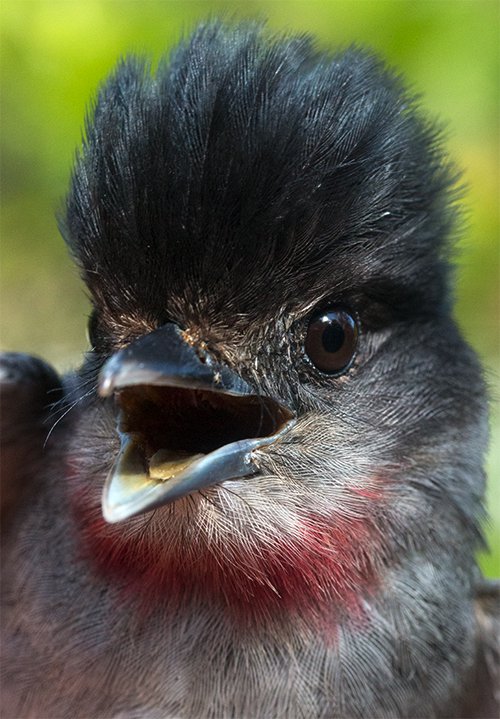
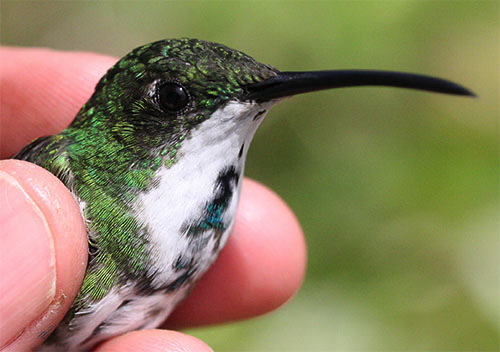
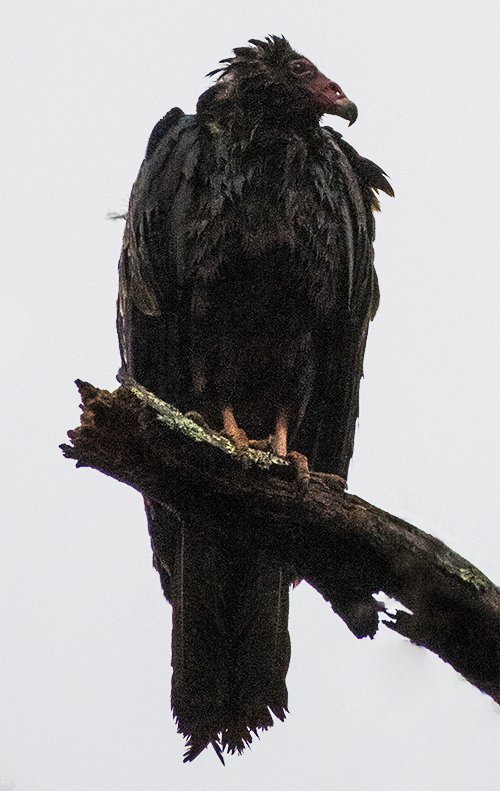
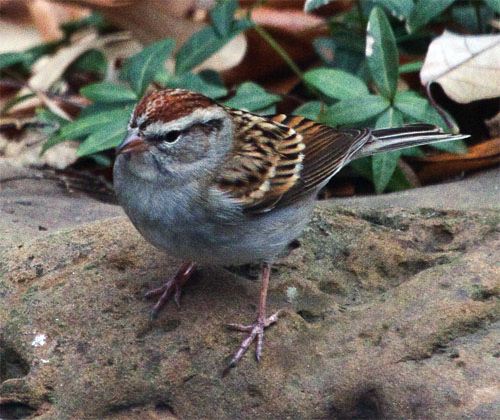
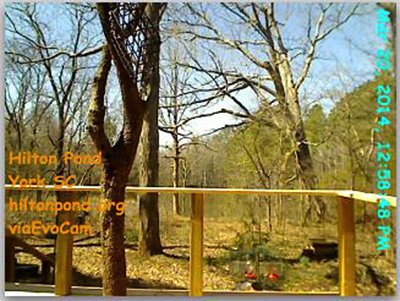
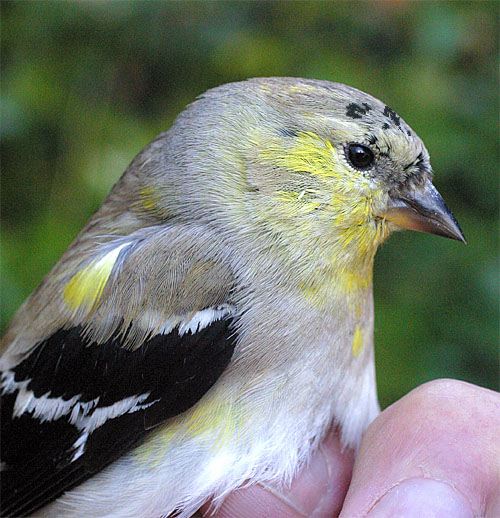
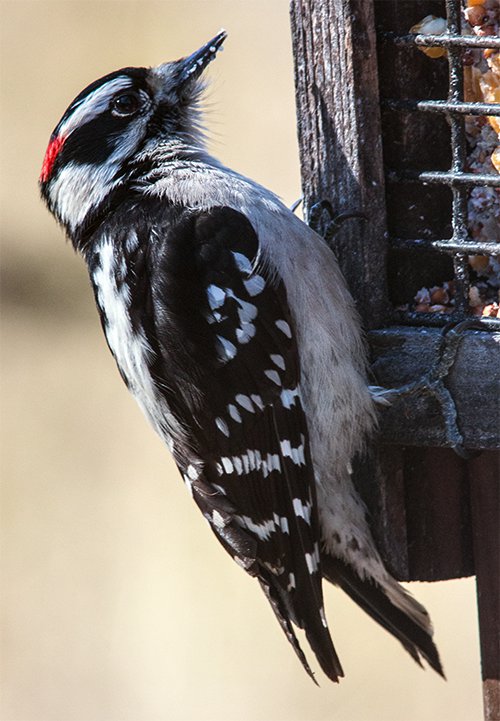
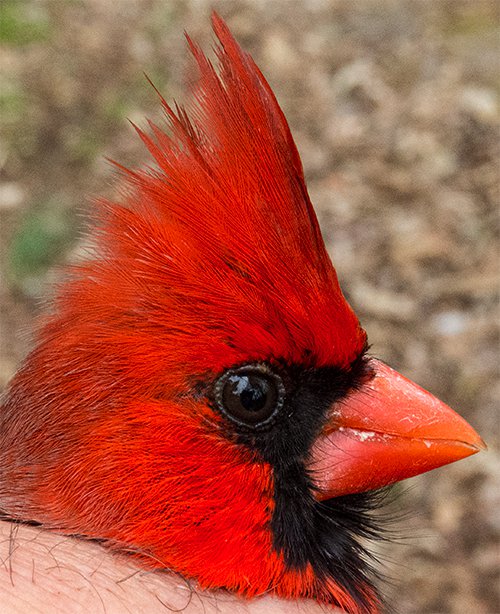
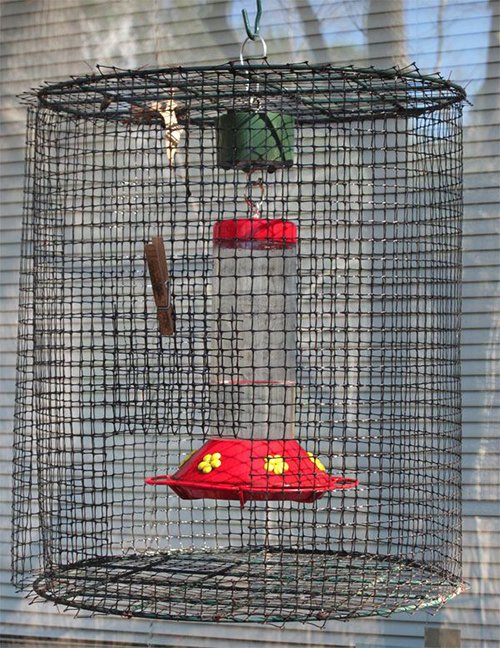
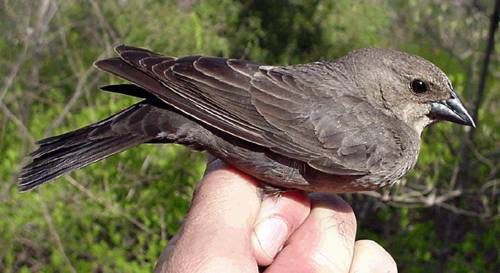
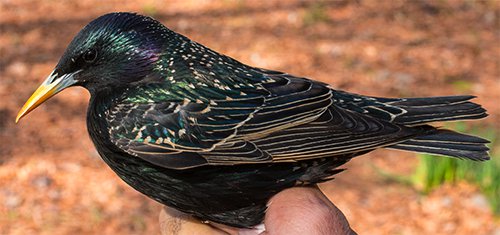
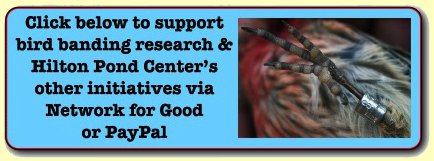

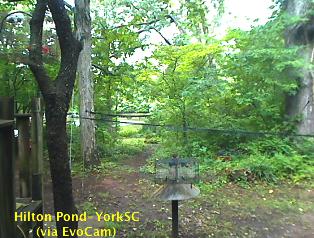

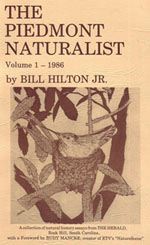



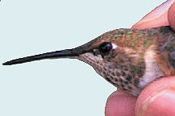 Oct 15 to Mar 15:
Oct 15 to Mar 15: